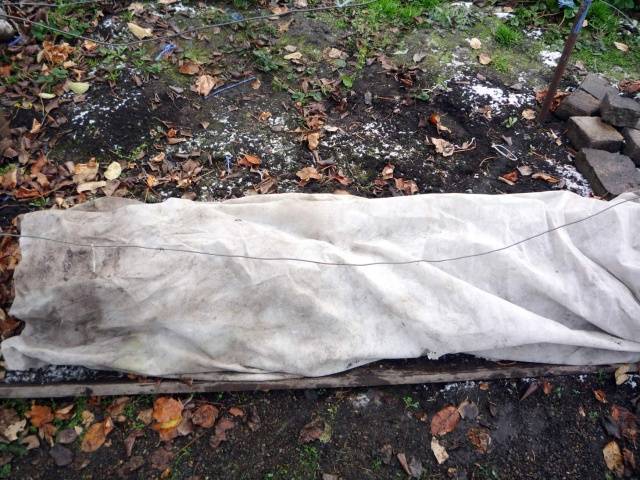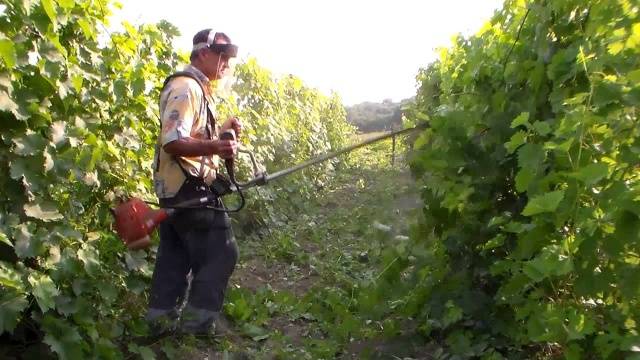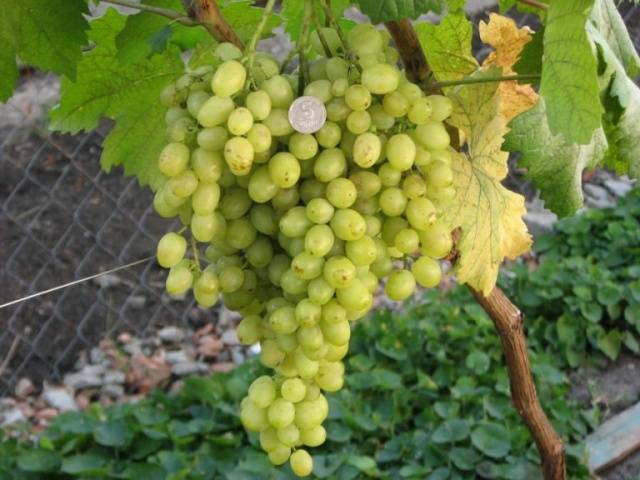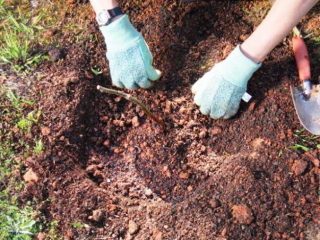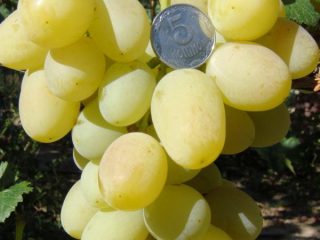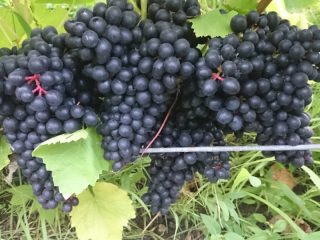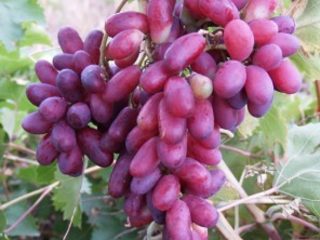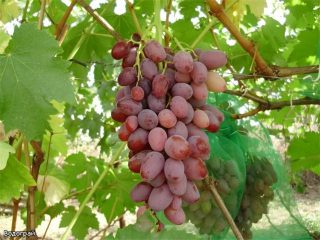Content
The Krasa Severa grapes were obtained by domestic scientists during the trans-pollination of the Typfri pink and Zarya Severa varieties. The alternative name of the variety is Olga. According to the description of the variety and photo, Krasa Severa grapes are distinguished by early ripening and good taste. The variety is used both fresh and for winemaking.
Characteristics of the variety
Description of Krasa Severa grapes:
- early maturation;
- growing season 110-115 days;
- vigorous bushes;
- high rate of ripening of shoots (up to 95%);
- winter hardiness up to -26 ° С;
- large, slightly dissected leaves;
- light green thin leaf plate;
- bisexual grape flowers;
- conical loose clusters;
- bunch weight 250-500 g.
Features of the berries of the Krasa Severa variety:
- dimensions 20x20 mm;
- rounded shape;
- average weight 4-5 g;
- fleshy juicy pulp of grapes;
- simple tart taste;
- white with a pinkish tint;
- thin, tough, tasteless skin;
- small seeds in the amount of 2-4;
- increased concentration of folic acid (0.23% per 1 mg);
- flavoring properties are rated at 8 points.
Up to 12 kg of berries are removed from the Krasa Severa bush. Fruit transportability is assessed as average. 1-2 clusters are left on the shoot. After ripening, the berries remain on the bushes for a long time and do not deteriorate.
Planting grapes
The place for growing grapes must meet certain conditions: illumination, fertility and soil moisture. The Krasa Severa variety is planted in prepared planting pits. Be sure to choose high-quality planting material. When planting in the ground, fertilizers are applied.
Preparatory stage
Planting work is carried out in October. It is allowed to land later, 10 days before frost. Autumn planting is more preferable than spring planting, since it contributes to the formation of the root system of grapes.
For planting crops, an illuminated area is chosen that is not subject to wind loads. The final taste of the berries and the yield depend on the presence of natural light.
Grapes are not planted in lowlands where moisture accumulates. When landing on slopes, choose its central part. It is best to choose a site in the south, west or southwest. The distance to fruit trees and bushes is more than 5 m.
Annual shoots have a height of 50 cm and a thickness of 7 cm. The optimal number of roots is more than 3. The plant should have ripe buds, the root system is powerful and not overdried.
Work order
A planting pit 80-90 cm in size is prepared for grapes. Then it is left for 3-4 weeks for the soil to settle.
The sequence of planting grapes:
- A drainage layer of crushed stone or crushed brick 10 cm thick is placed at the bottom of the pit.
- A plastic pipe 5 cm in size is placed vertically in the pit. 20 cm of the pipe should remain above the ground surface.
- Fertile soil is poured on top.
- 0.2 kg of potassium salt and superphosphate are added to the landing hole.
- Fertilizers need to be covered with earth, and then reapplied.
- Pour soil on top, which is watered abundantly.
- When the earth settles, they start planting grapes. The roots of the plant are kept in clean water for a day, after which the shoot is cut off, leaving 4 eyes. The roots of the plant are shortened a little.
- A hill of earth is poured into the hole, grapes are placed on top.
- The roots are covered with soil, which is well compacted.
- The grapes are watered abundantly with warm water.
In order for the seedling to take root faster, the soil under it is covered with a film.Holes are left under the plant and watering pipe. The top of the plant is covered with a 5-liter plastic bottle with a cut-off neck.
Variety care
Krasa Severa grapes yield a high yield with constant care. Plants are looked after by watering and feeding. In the fall, the bushes are pruned and prepared for winter. Special means are used to protect against diseases.
Watering
After planting, the grapes need regular watering. Around the trunk, the plants form a hole with a diameter of 30 cm. For each bush, 5 liters of water are required weekly. After a month, the intensity of watering is reduced. It is enough to water the plants twice a month. In August, the introduction of moisture is completely stopped.
Adult bushes are watered several times per season:
- after the snow melts and the shelter has been removed;
- a week before the blooming of the buds;
- after flowering;
- a week before the shelter for the winter.
Young grapes are watered through a pipe dug in when planting a crop. The moisture should settle and warm in the sun.
When the berries begin to ripen, the introduction of moisture is completely stopped until the onset of autumn. Watering in the winter helps the grapes to endure the winter better.
Top dressing
The use of fertilizers has a positive effect on the development of culture. When nutrients are introduced into the planting pit, the feeding of the grapes begins in the fourth year.
After removing the shelter, Krasa Severa grapes are watered with a solution consisting of 35 g of superphosphate, 25 g of potassium sulfate and 40 g of ammonium nitrate. Substances are applied in dry form directly into the soil. In summer, nitrogen fertilizers are removed from top dressing so as not to cause excessive growth of green mass.
A week before flowering, plantings are treated with slurry with the addition of potash and phosphorus fertilizers in the amount of 20 g each. When the berries ripen, the plants are fed only with phosphorus and potassium.
Krasa Severa grapes respond positively to foliar treatments. They are carried out using complex fertilizers Aquarin or Kemira. Plants are sprayed on a leaf in cloudy weather or in the evening.
Pruning and tying
As they grow, the grapes are tied to supports. It is best to install several supports and pull a wire between them. Shoots are fixed horizontally at an angle, vertically, in an arc or ring.
According to the description of the variety, photos and reviews, the correct pruning of Krasa Severa grapes ensures high yields. The procedure is carried out in the fall after harvest.
When pruning, you need to leave from 5 to 8 eyes. Long pruning is allowed when 10-12 eyes remain on the shoot.
In the spring, if the grapes are damaged, the vine recovers for a long time, which negatively affects fruiting. Elimination of broken and frozen shoots is allowed in early spring. In summer, it is enough to pinch the vine, remove excess shoots and leaves that cover the bunches of berries.
Shelter for the winter
In the fall, grapes are fed wood ash and prepare planting for winter. In regions with severe winters, the vine is removed from the support and laid on the ground.
The grapes are spud and covered with spruce branches. A frame of metal arcs is erected from above, to which agrofibre is attached. In winter, additional snow is thrown over the bushes.
Disease protection
The Krasa Severa variety has an average resistance to fruit cracking and gray rot. When gray rot spreads, the green parts of the grapes are covered with bloom. The disease develops in damp weather.
Krasa variety is susceptible to powdery mildew and mildew. Oidium appears as a powdery bloom on grapes. Gradually, the leaves of the plant become curly, the berries dry out.
Mildew has the appearance of oily spots that appear on the leaves. At high humidity, plaque forms on the back of the leaves.The affected parts of the plant turn yellow and die off.
To protect the vineyard from diseases, pruning is carried out in a timely manner, stepsons are eliminated, fertilizers are applied with phosphorus and potassium. Plants are treated with drugs Ridomil, Antrakol, Horus, copper oxychloride. The procedures are carried out in early spring before flowering.
Gardeners reviews
Conclusion
Krasa Severa grape is a table variety that ripens early. It is characterized by good taste, juicy pulp and rich in nutrients composition. The variety brings a high yield, tolerates frost well in winter. The bunches hang on the bushes for a long time, are subject to long-term transportation. Variety care consists in watering, feeding and preventive treatments.
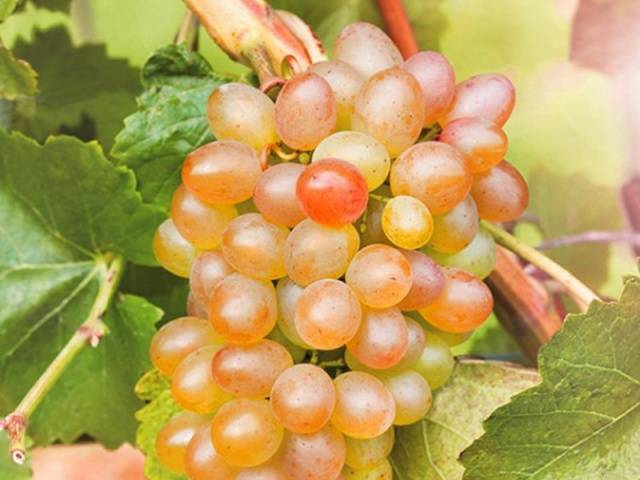

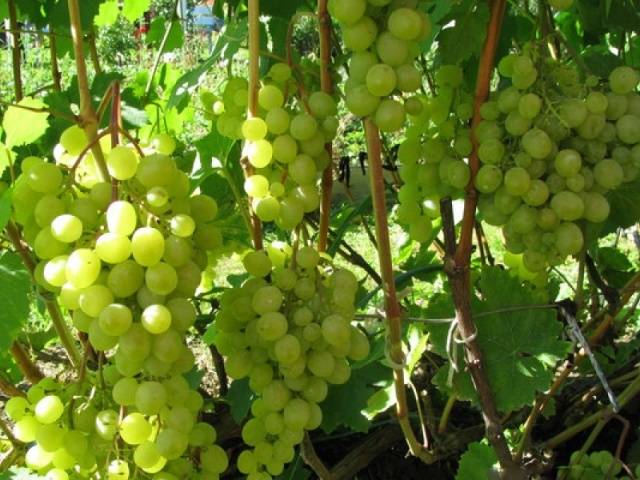
.jpg)
